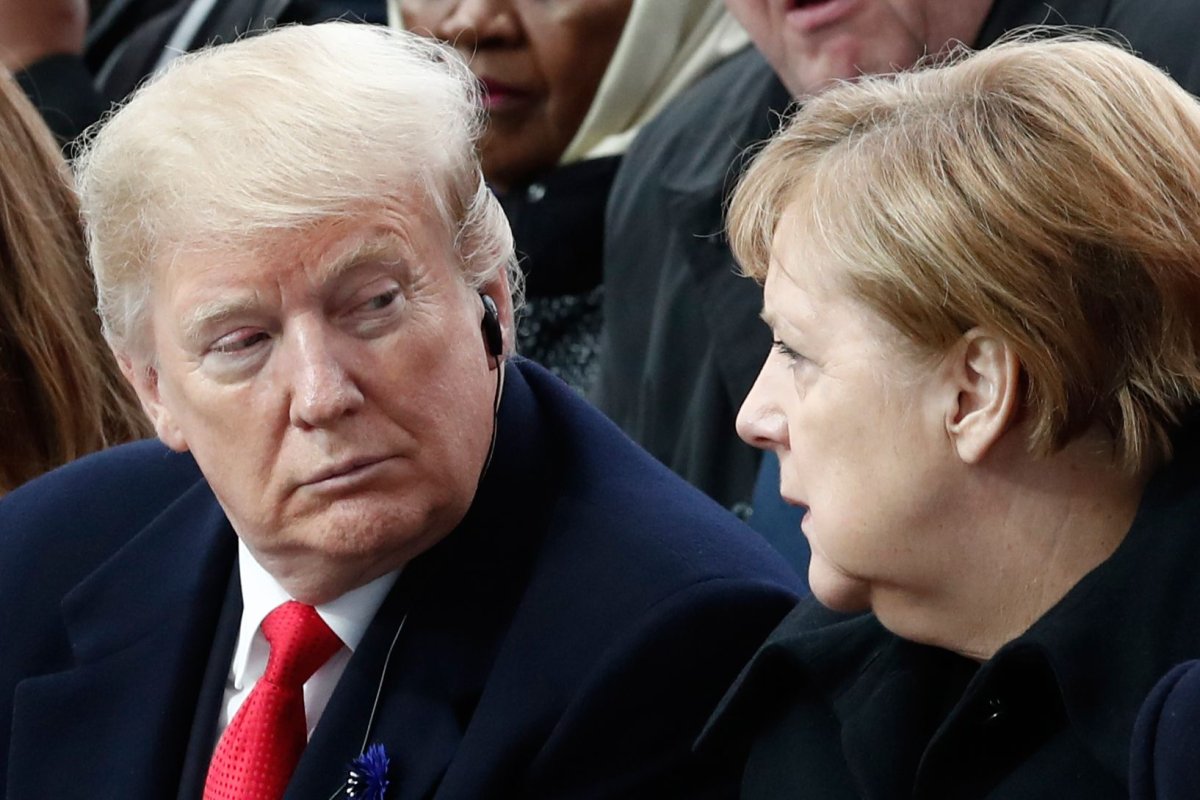President Donald Trump and German Chancellor Angela Merkel had never been the best of friends. From their very first meeting, the gulf between their respective temperaments and political styles was clear.
Trump struggled—or refused—to consider the views or accept the advice of one of the major figures in modern world politics, while attacking the ideology and institutions the four-time chancellor spent decades helping to create and maintain.
Read More: Donald Trump says the EU was set up in order to hurt the United States
According to multiple anonymous sources who spoke to The New Yorker magazine, their wildly different personalities meant any prospect of friendship was doomed from the start.
As a trained scientist with a doctoral degree, Merkel, a senior German official told the magazine, might have been "expecting too much of her audience" when first trying to build a working relationship with the new president of the United States.
"She talks about things that you get the impression he doesn't fully grasp," the official said, recalling one meeting at which Merkel tried to explain the complex politics of the Middle East.
Though other politicians—such as Japanese Prime Minister Shinzo Abe and, at least initially, French President Emmanuel Macron—resorted to flattery to bridge the understanding gap, that was not Merkel's style. "She doesn't flatter," another German official told The New Yorker.
Regardless of whether refusing to coddle the president was the best approach, German talking points never really landed with Trump. One German official recalled that despite detailed preparation for a discussion about trade, the president simply laughed off evidence that Germany was, in fact, not ripping off the U.S. "It's very hard to get through to him with fact-based arguments," the official explained.
Whether stemming from ignorance, nationalism or political point-scoring, Trump has been a longtime critic of the European Union, which, some observers have argued, is in his mind synonymous with Germany. The president has claimed regularly that the EU abused the U.S. on trade, even suggesting the entire bloc was designed to hurt America.
Trump has demanded European trade concessions, threatened to impose tariffs and supported Brexit, though in true Trumpian style suggested that British Prime Minister Theresa May should have followed his advice to secure a better departure from the bloc.
The president has even called the EU a "foe" of the U.S. on trade on the same level as China, despite a long—though admittedly not always smooth—history of cooperation between Washington and Brussels.
Last month, Trump told The Wall Street Journal, "The only difference between the EU and China was size. They treat us very badly. They don't take our farm products. They don't take our cars. They don't take anything. And yet, we give them a lot."
An unnamed senior U.S. official told The New Yorker, "Many European leaders have told me that they are convinced that President Trump is determined to destroy the EU."
Former President Barack Obama apparently shared the same fears, according to some of his senior advisers. On the last foreign trip of his presidency, days after Trump's electoral victory, Obama sat with Merkel for three hours to discuss the shifting landscape of global politics.
Charles Kupchan, Obama's top National Security Council adviser on Europe who was also on the trip, told The New Yorker that Obama "was obsessed with the fate of Europe during his last year in office.
"His view was that Merkel was needed to keep Europe together," Kupchan said. "He was afraid that, without Merkel, Humpty Dumpty was going to fall off the wall." According to Benjamin Rhodes, Obama's deputy national security adviser, the president told Merkel that Trump's tenure in the White House would be like a storm, advising the chancellor to "try to find some high ground" and hang on to it.
Since Obama left office, Merkel has been busy fighting her own domestic battles. Poor election results forced the chancellor into tortuous negotiations to form a ruling coalition with the center-left opposition, as the far-right Alternative for Germany party became the country's third largest.
Subsequent regional electoral failures then forced the chancellor to step aside as leader of her Christian Democratic Union party, though she plans to see out her term as chancellor until 2021.
Though European politicians first tried to work with Trump, it increasingly appears that they are hoping to wait him out. Following the Republican Party's defeat in the midterm elections and amid multiple ongoing investigations into Trump and his inner circle, the president looks more vulnerable than at any point in his term so far.
When the next Congress is seated on January 3, the president will be facing a majority Democratic House of Representatives, populated by many hostile lawmakers with investigative and subpoena power. Things are unlikely to get any better for Trump in 2019.
According to Ivo Daalder, the former U.S. ambassador to NATO, Trump's "America First," unilateral, transactional brand of global politics has put a freeze on transatlantic relations. "The allies spent all of 2017 trying to figure out how they could entice him into more of a traditional relationship, and they collectively absolutely failed," he told The New Yorker.
"I don't believe there is a single person in Europe who now thinks we can go back with this president."

Uncommon Knowledge
Newsweek is committed to challenging conventional wisdom and finding connections in the search for common ground.
Newsweek is committed to challenging conventional wisdom and finding connections in the search for common ground.
About the writer
David Brennan is Newsweek's Diplomatic Correspondent covering world politics and conflicts from London with a focus on NATO, the European ... Read more
To read how Newsweek uses AI as a newsroom tool, Click here.








